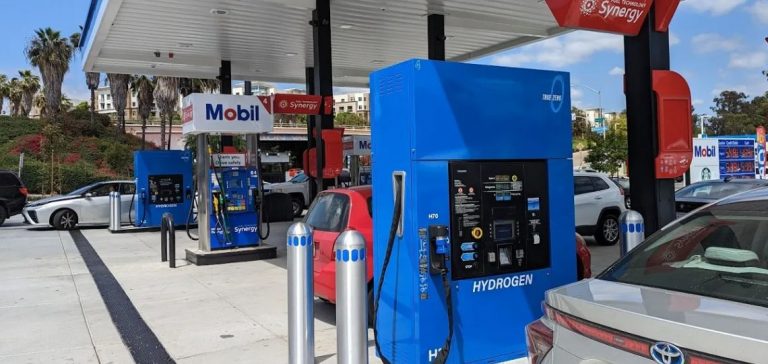California’s retail hydrogen pump prices reached a record high in September, marking a significant increase one year after the start of supply disruptions. These disruptions led to the closure of several refueling stations and a drop in light-duty hydrogen vehicle sales.
Platts, a subsidiary of S&P Global Commodity Insights, assessed the monthly average price of hydrogen for light-duty vehicles in California stations at $34.55 per kilogram as of October 1, reflecting a 1.3% increase compared to the previous record set in January 2024. According to Commodity Insights data, this rise is attributed to price hikes by Iwatani and Air Products, which raised their prices to $29.99/kg and $29.96/kg, respectively, alongside a resumption of operations at several stations since September 1.
Impact of Market Disruptions
True Zero, which operates the largest number of stations in California, reported minimal changes in station availability, although more stations moved to a $36/kg rate compared to below $30/kg the previous month. The supply disruptions, which began about a year ago, have led to a continuous rise in retail hydrogen prices in the state, averaging $33.49/kg this year according to Platts data. Since the assessments began in September 2021, the average monthly prices have surged by 119%.
Sales of light-duty fuel cell electric vehicles (FCEVs) plummeted in California due to the infrastructure challenges. Second-quarter light-duty FCEV sales dropped 90% year-on-year, from 972 units sold in Q2 2023 before the supply disruptions to 95 units in Q2 2024, according to California Energy Commission data.
Hydrogen Market Outlook
Brian Murphy, Senior Analyst of Hydrogen and Low-Carbon Gas at Commodity Insights, stated that light-duty fuel cell electric vehicles would play a “very minor” role in the short and medium term. “The California LD-FCEV market has shrunk in the past two years due to consumer preference for battery-electric drivetrains (BEVs), and we believe this trend is predictive for the national market,” he added. “Investments in BEVs and charging infrastructure are significantly larger than those in FCEVs and light-duty hydrogen refueling infrastructure.”
Refueling Station Availability
After a year of disruptions in gaseous hydrogen supply in Southern California, several stations operated by True Zero, Messer, and Iwatani remain offline with no estimated return date for regular service levels. An additional refueling station operated by Iwatani may soon go offline, a market source told Commodity Insights. The Riverside Fueling station is listed as “temporarily offline” on Iwatani’s appointment booking page as of October 1.
A closure would follow a series of temporary – or, in Shell’s case, permanent – station closures since the supply disruptions began a year ago. Iwatani was unavailable for comment at the time of publication.
As of October 1, a snapshot of the Hydrogen Fuel Cell Partnership’s refueling station tracker listed 55 retail stations, with 12 unavailable due to ongoing hydrogen supply disruptions and five offline due to mechanical issues. New retail light-duty stations are under development in the state: 18 stations are in the permitting process as of a September 11 HFCP report, two are under construction, and four proposed stations have secured site control.
The lack of available refueling stations has partially spurred a class action lawsuit from Toyota Mirai customers in the state. The lawsuit alleges that Toyota inaccurately assures consumers that hydrogen refueling is “available, seamless, and comparable to refueling with gasoline.”
Shift Toward Heavier Applications
California appears to be shifting toward heavier applications for hydrogen fuel, according to a Commodity Insights analysis. The state is testing the use of alternative fuels in rail, marine, and aviation sectors. The state’s developing hydrogen hub seems to have no plans to support the struggling light-duty sector. “Our analysis shows that hydrogen is a better fit for medium- and heavy-duty applications, and we expect investment flows to concentrate in those markets going forward,” Murphy concluded.






















